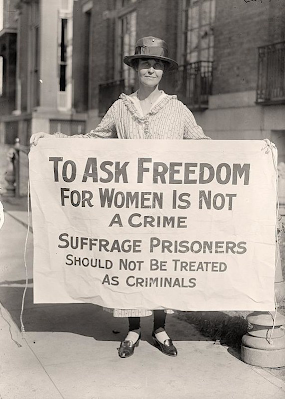Stepping into Feminism
I have been taking a class called The Art of Rhetoric over the last couple of months. The most recent unit is called Challenge. In this unit we have been thinking about challenging the status quo. We met with a couple of representatives in Chicago including Alderperson Byron Sigcho-Lopez. We also met with Ugo Okere, a previous candidate for the 40th ward aldermanic position. They both shared with us some of what they do along with some of their own positions regarding the city government and how they might challenge the status quo. I was asked to write an op ed that relates to some I feel passionate about. I chose to talk about how we interact with each other and how feminism is viewed today. Through this project, I was able to gain a better understanding of both my own opinion and an opposing opinion. Writing this oped has created an environment that will allow me to better think about Feminism in general. I feel that this op ed is talking about more general things and touches on multiple topics, this is way I chose to title the op ed "Stepping into Feminism". I was also asked to include an addendum paragraph that talks about the rhetoric I used in my op ed. I would also like to include just a content warning: there will be some more vulgar language used in this but they will be censored.
I hope you enjoy my op ed.
As a teenage girl growing up in the 21st century, I have seen and felt criticism toward me for simply being a female. I have had men harass me because they think it is their right to do so. Why is this? Why do we still view being a woman as an automatic disadvantage?
To begin to answer this question, we start with the idea of the "American Dream" from the 1950’s where “idealistic” norms for what people thought their lives should be. This norm was to have, “a perfect family, a secure job, and a perfect house in the suburbs” (Francisco) where the father worked a job and the mother stayed home to do “women’s work.” Unfortunately, it also includes the idea that men are in charge and women need to submit to them not knowing what is best for themselves. At the same time, romanticizing and fetishizing women, left them to be overpowered and controlled by their husbands.
Our school systems today continue to be a major contributing factor to sexism. While we have made strides in equal education opportunities, we still have an environment where girls have to dress modestly or face the consequences of the male gaze. Even shoulders can be viewed as “distracting” and “disruptive,” causing the girls to be pulled out of class or sexualized in the minds of boys. This type of sexism occurred at Bartram Trail high school. As of April 2021, “83%”(Shields) of dress code violations were given to girls.
Our society’s obsession with controlling and dominating women has had detrimental effects on the way we view ourselves and others. We have created derogatory language used to annihilate women's self esteem and self worth. Words like “b**ch”, “sl*t”, “c**t”, and “p***y” have been weaponized and create a negative implication for women. Often women need to change their personality or appearance to make either those around them more comfortable or to protect themselves from harassment.
Feminism is a term that refers, in its most basic form, to those who fight for equality on the basis of sex. This term, however, has been one that many do not want to associate themselves with because it is misunderstood as hatred toward men and the overall patriarchal system. Feminism has become a multi-faceted topic and one that causes controversy and division in our society. There are people who say that the objective of feminists is to get women to overpower men, but I would say, the ultimate goal is to get everyone to be treated equally.
Fighting for equality is not a new idea. An early feminist was the famous philosopher, Plato. In his words, “women possess ‘natural capacities’ equal to men”(Onion). He was ahead of his time, and his belief was not well accepted. Many thought that if they started to view women as their equals, they would eventually become their superiors. This is a thought process that can be seen throughout time and history and is still prevalent today.
Through the generations of women fighting for equality many changes to laws and societal norms have been accepted. For example, women were not allowed to vote in the United States until 1920. It is our job as a society to combat the effect of sexism that is still prevalent today. Even more than the lack of sexism, we need equality. We need to teach both our current and future generations to respect one another. I want to ask you to put your ego aside and try to view our society through the eyes of a teenage girl. If you are able to do this, we may be able to address and challenge the major issue that women deal with today.

Rhetorical analysis:
I hope you enjoy my op ed.
As a teenage girl growing up in the 21st century, I have seen and felt criticism toward me for simply being a female. I have had men harass me because they think it is their right to do so. Why is this? Why do we still view being a woman as an automatic disadvantage?
To begin to answer this question, we start with the idea of the "American Dream" from the 1950’s where “idealistic” norms for what people thought their lives should be. This norm was to have, “a perfect family, a secure job, and a perfect house in the suburbs” (Francisco) where the father worked a job and the mother stayed home to do “women’s work.” Unfortunately, it also includes the idea that men are in charge and women need to submit to them not knowing what is best for themselves. At the same time, romanticizing and fetishizing women, left them to be overpowered and controlled by their husbands.
Our school systems today continue to be a major contributing factor to sexism. While we have made strides in equal education opportunities, we still have an environment where girls have to dress modestly or face the consequences of the male gaze. Even shoulders can be viewed as “distracting” and “disruptive,” causing the girls to be pulled out of class or sexualized in the minds of boys. This type of sexism occurred at Bartram Trail high school. As of April 2021, “83%”(Shields) of dress code violations were given to girls.
Our society’s obsession with controlling and dominating women has had detrimental effects on the way we view ourselves and others. We have created derogatory language used to annihilate women's self esteem and self worth. Words like “b**ch”, “sl*t”, “c**t”, and “p***y” have been weaponized and create a negative implication for women. Often women need to change their personality or appearance to make either those around them more comfortable or to protect themselves from harassment.
Feminism is a term that refers, in its most basic form, to those who fight for equality on the basis of sex. This term, however, has been one that many do not want to associate themselves with because it is misunderstood as hatred toward men and the overall patriarchal system. Feminism has become a multi-faceted topic and one that causes controversy and division in our society. There are people who say that the objective of feminists is to get women to overpower men, but I would say, the ultimate goal is to get everyone to be treated equally.
Fighting for equality is not a new idea. An early feminist was the famous philosopher, Plato. In his words, “women possess ‘natural capacities’ equal to men”(Onion). He was ahead of his time, and his belief was not well accepted. Many thought that if they started to view women as their equals, they would eventually become their superiors. This is a thought process that can be seen throughout time and history and is still prevalent today.
Through the generations of women fighting for equality many changes to laws and societal norms have been accepted. For example, women were not allowed to vote in the United States until 1920. It is our job as a society to combat the effect of sexism that is still prevalent today. Even more than the lack of sexism, we need equality. We need to teach both our current and future generations to respect one another. I want to ask you to put your ego aside and try to view our society through the eyes of a teenage girl. If you are able to do this, we may be able to address and challenge the major issue that women deal with today.
(RV1864, Suffragette, Aug 2015)
Rhetorical analysis:
In the op ed above I used the rhetorical appeals, ethos, logos, and pathos. I used ethos when saying, “I have had men harass me...”. This created a sense of credibility to the topic I am discussing. I used logos to appeal to the audience's logical thinking when stating the statistic of 83% of dress code violations go to girls. I used pathos when mentioning more derogatory language. The intention behind this was to surprise the audience and make them realize the seriousness of the situation.
Works Cited:
Onion, Amanda, et al. “Feminism.” History.com, A&E Television Networks, 28 Feb. 2019, https://www.history.com/topics/womens-history/feminism-womens-history.
Shields, Leah. “Public Records Show More Dress Code Violations for Female Students in St. Johns County Schools.” Firstcoastnews.com, 12 Apr. 2021, https://www.firstcoastnews.com/article/entertainment/television/programs/gmj/public-records-disproportionate-dress-code-violations-female-students-st-johns-county-schools/77-a2bd2163-f28d-427b-9815-7e9b8b5c8cd1.
Francisco, Tayler. “The American Dream in the 1950s.” Prezi.com, 12 Oct. 2012, https://prezi.com/4qjuueortn-k/the-american-dream-in-the-1950s/.
Works Cited:
Onion, Amanda, et al. “Feminism.” History.com, A&E Television Networks, 28 Feb. 2019, https://www.history.com/topics/womens-history/feminism-womens-history.
Shields, Leah. “Public Records Show More Dress Code Violations for Female Students in St. Johns County Schools.” Firstcoastnews.com, 12 Apr. 2021, https://www.firstcoastnews.com/article/entertainment/television/programs/gmj/public-records-disproportionate-dress-code-violations-female-students-st-johns-county-schools/77-a2bd2163-f28d-427b-9815-7e9b8b5c8cd1.
Francisco, Tayler. “The American Dream in the 1950s.” Prezi.com, 12 Oct. 2012, https://prezi.com/4qjuueortn-k/the-american-dream-in-the-1950s/.


Comments
Post a Comment